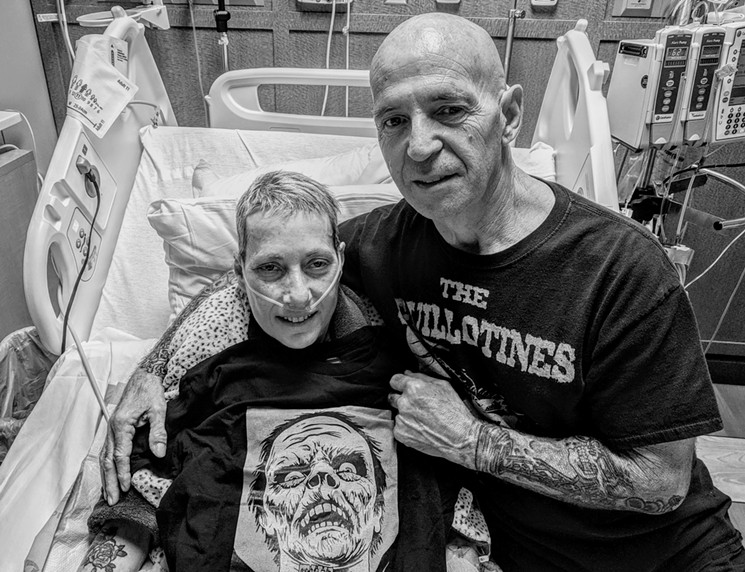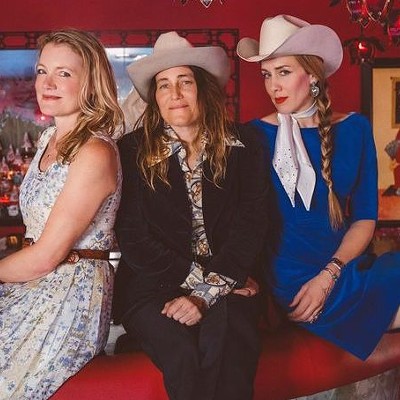Support Us
Houston's independent source of
local news and culture
account
- Welcome,
Insider - Login
- My Account
- My Newsletters
- Contribute
- Contact Us
- Sign out
Finding Grace at the End of the Rock’n’Roll Road: Julie DeGidio’s Life Fight
David Ensminger September 20, 2019 10:23AM

Sublime rock'n'roll anchor Julie DeGidio of the Guillotines at Rudyard's
Photo by David Ensminger
[
{
"name": "Related Stories / Support Us Combo",
"component": "11591218",
"insertPoint": "4",
"requiredCountToDisplay": "4"
},{
"name": "Air - Billboard - Inline Content",
"component": "11591214",
"insertPoint": "2/3",
"requiredCountToDisplay": "7"
},{
"name": "R1 - Beta - Mobile Only",
"component": "12287027",
"insertPoint": "8",
"requiredCountToDisplay": "8"
},{
"name": "Air - MediumRectangle - Inline Content - Mobile Display Size 2",
"component": "11591215",
"insertPoint": "12",
"requiredCountToDisplay": "12"
},{
"name": "Air - MediumRectangle - Inline Content - Mobile Display Size 2",
"component": "11591215",
"insertPoint": "4th",
"startingPoint": "16",
"requiredCountToDisplay": "12"
}
,{
"name": "RevContent - In Article",
"component": "12527128",
"insertPoint": "3/5",
"requiredCountToDisplay": "5"
}
]
Underground music in Houston has often been powerfully shaped by women, and mothers too, who defy expectations, free themselves from the gnawing reins of sexism, and forge music that stretches boundaries. Just think of Mydolls, Stinkerbell, Pain Teens, Manhole, Magnetic Four, Zipperneck, and Merkava.
Julie ("Jewels") DeGidio, who has been undergoing long-term treatment for lung cancer, has been an anchor for bands like the sizzling Guillotines. Equally interesting, she has balanced a conservative, spiritual outlook with compelling expressions of greasy, hammering music that overruns all the clinical, sparkly pop music zigzagging through American radio and religion.
In fact, overall, for decades women have been responsible for characterizing much of rock’n’roll’s instinct, resilience, and firepower. Yet, flip through the pages of history books, and most authors give them simplistic treatments — no great applauds, just nods to backseat roles and lipstick traces. Still, most people can easily conjure up images of Joan Jett (the Runaways), Wendy O. Williams (the Plasmatics), Deborah Harry (Blondie), and dozens more. DeGidio belongs in the pathways underscored by those trailblazers.
In fact, she belongs in two worlds, simultaneously – one in which molten music whorls with the body electric, and another one that begins with a morning quote from Jesus that helps her focus thoughts and find grace, especially during daunting times, like being on the 12th floor of the world’s finest cancer hospital as a patient advocate is thrilled, but bewildered, by her lifestyle.
One must understand. In a time when this country is rendered apart along fault-lines like faith and rebellion, DeGidio is a rare bridge, a way to navigate T. Rex, the Heartbreakers, and the Garden of Eden. She is the one who can laugh off suggestions that she is playing the “devil’s music” while simultaneously discussing do-not-resuscitate forms.
And when tears well up in her eyes, and her head bobs lightly, hair cut as short as when she was a first grader, what bothers her most, as she depends on tubes for clear streams of oxygen, is not being able to play music, to be in the band, to feel the power, craft, and poetry — the sublime touch of God in the guitar note.
Though born in Valparaiso, IN, she grew up in Texas with a devoutly Catholic family who were her musical predecessors; her mother “played piano beautifully,” she recounts, while one of her prized family photos features her father and grandfather playing guitars together at a Chicago World’s Fair during the 1930s.
Music was a mainstay in their lives, a way of being in the world, not a mild sedative or diversion. It was a language and mindset they shared.
As a youngster at an all-girl school, DeGidio first took notice of the snare drum; but after realizing how heavy it was (and awfully awkward to balance on a jittery bicycle), she took up the clarinet.
But by the mid-1980s, when she was older and settled in College Station, a new direction took shape. After hanging out with some local musicians, they left the room to partake of illicit drugs in a back room, leaving a Rickenbacker bass all alone in front of her.
She drew it close, and though not all trained and experienced, began to let her fingers glide through notes and rhythms. When the men stumbled back into the room, they looked at her, surprised. “You play bass?” they asked. “Now, I do,” she said, her confidence etched in a sly smile.
And within a few years she was playing local clubs, mostly trying to carve out a niche for original laid back music among the million cover bands that dotted the scene. But raising a child, who was born in the mid-1980s too, while forging a music identity wasn’t easy and could generate small frictions with her daughter, who often held up her arms, ready to play. She’d frown bitterly when mom spent time polishing her songs and scales instead of scooping her up, ready for Play-Doh and crayons.
Still, DeGidio found a balance, loved the girl to pieces, and plugged away at the bass, developing a warm, agile, and clocklike precision honed throughout the years.
But when her husband-to-be Bill DeGidio arrived in Texas, and they met by accident at the 19th Hole, a longstanding “down-to-earth” venue in Conroe, she had given up music, mostly. Heck, she had just gotten divorced as well.
Bill himself was a relocated Midwesterner as who had cut his teeth in bands like the Pagans, the titans of bastardly Cleveland rock’n’roll that tore up the night in the era unfolding with the Dead Boys, Pere Ubu, and the Electric Eels. And when he discovered her bass gear stuffed in a closet, he knew he had found not just a lover, but a simpatico musical adventurer.
“I don’t play anymore,” she admitted, but within days he goaded her into jamming in the living room. Then he snuck over to a club to feel out the potentials. “Okay okay, I play, but not live,” she insisted. Again, he persisted.
And despite just a handful of practices, they became St. Cannabis, rocking the north side of the mega-city, which drew the unwanted attention of the local police.
So, they dropped the name and became Chelsea Hotel, playing tried-and-true breakneck rock’n’roll that seemed plucked from the year 1980. Soon, they scored a gig in the inner loop at the Oven, a now forgotten joint across from Numbers. After a few years, they joined bigger bills, like a night with Batusis, featuring legends Sylvain Sylvain (New York Dolls) and Cheetah Chrome (Dead Boys).
Bill was with his extended underground rock'n'roll family. It was a reunion of sorts: blistering, familiar, swaggering, thirsty, and rabid. And Julie provided the low-end to the Chelsea Hotel din – she offered up a steadying hand in the tumult.
In 2004, the band released their trademark Do It Again album, which showcased fast-paced, sing-along, twin-guitar fueled, beefed-up guttural grit, including their uncanny meld of Zeke, Pagans, and Ramones, which came into full focus on “R.I.P. aka Joey.” In other tunes, they decried corruption and destruction (“Wasted”), plus revisited rock’n’roll luminaries on “Johnny Be Good,” an ode to Johnny Thunders, which utilized their own southern-brewed New York Dolls swing.
Meanwhile, “Lonesome Line” slowed down into a noisy swamp ruckus that reminds one of Australian rockers like the Scientists. “51%” barrels down the road, spare and hard, evoking the worlds of power, money, Lincoln cars, and long lost BB King.
In each, Julie’s bass plumbs through the wall of sound, like a ductile, pliant anchor, holding down the rhythm section without restraining the super-charged riffage.
As that band splintered and faded, the DeGidios re-grouped as the Guillotines.
In fact, the family affair that defined and carved both bands went beyond the couple, for Curtis DeGidio, Bill's son, provided half of the searing twin guitar assault. "When I really got to know her, it wasn’t in the typical familial situations. Instead Jewels, my dad, and I got to create something together that I will carry with me my whole life," reveals Curtis. "We shared a lot of jokes and banter behind the front lines of both projects, sometimes only to the amusement of each other."
Wrapped up in their own DeGidio rock'n'roll cocoon, they seemed to speak a language of their own. And their roles were not routine.
"I think back to the first time I ever visited Texas after Jewels and my dad married," Curtis continues. "My dad had work obligations, so Jewels volunteered to bum around Houston with me since I had no car at the time. We ended up at the Houston Museum of Art, where she entertained all of my pseudo-intellectual droning, like a typical twenty-something, about design and visual communication. The whole day she had a whimsy about her that made it feel more like I was hanging out with a good friend instead of a stuffy parent."
Curtis is no longer in the Guillotines; instead, he has opted to thunder and roar with the Velostacks.
So, now featuring two members (Andy Kaos, Glenn “GG” Gilbert) of Richie Ramone’s touring band, the newly minted Guillotines has just debuted their Six Pack EP, which explores a familiar sonic territory.
With slower indulgences but unrepentant high voltage, R-rated kicks that recall D Generation, Black Halos, and Electric Frankenstein, the new songs on Six Pack picture the dirty, soiled streets of the music underworld, whether ripping through Ted Nugent riffage during “On the Street” or conjuring the pills, sloshed drinks, girls, and wastedness of “Lost Another Night.” That tune, in particular, recounts the sodden debauchery of a simple man coming undone in the nocturne.
And Julie, as the elastic backbone of the tunes, is center stage with her warm sinewy musical stride.
“Jewels is the rock that holds it all down on the bass,” avows Lisafer, the mastermind behind Screech of Death and seasoned player who has shredded in bands like Snap-Her, 45 Grave, DI, and more. “She always exudes a powerful energy onstage and off. She is unique and a real standout.”
Indeed, Julie is her own breed. “She is unique,” Lisafer continued. “A rare one. Heart, beauty, energy, and style.”
"For anyone who knows Jewels, it is undeniable the amount of love and empathy she has for those people fortunate enough to have her in their life," Curtis insists as well.
She exists as a soulful patchwork, a figure that cuts through clichés. Even when inching closer to death, she exudes humor and sarcasm, like making small Facebook blasts about still being alive, despite the worries and rumors.
She’s not succumbed to the dying light yet. “I’m a lil more stubborn than that,” she reported to the digital world.
No doubt, the songs of The Guillotines are miles away from any of the cerebral, post-punk constructions of bands typifying the coverage of women in rock, like Sleater Kinney. But they remain well within the working-class, shoot-from-the-gut genres epitomized by Nashville Pussy and others that feature women too, though they often remain overlooked.
Some would call the music of the DeGidios retrograde, others might simply nickname it ‘back-to-basics.’ But what most people fail to grasp is rock’n’roll, when in the cusp of the groove and overlapping with flared noise and pushing beat, is a titanic place, full of momentary glee, grace, and gluttony, all combined. It is a saga enfolded into two and half minutes, a soul-search in three chords and a solo.
And I believe that Julie knows that too well. And when the feeble light of a hospital room, with its colored lights blinking at the end of the bed, and a TV humming on the wall, and a window peeking across the medical city, can’t offer much, even the mere memory of playing that throbbing bass will give her pause, just like a few words from scripture.
And in those moments, even as the rock’n’roll road begins to dim, she will know her spirit: it will always hang in the songs.
Minutes from now, another girl will pick up a snare, clarinet, or bass. And each of them will benefit a small bit from DeGidio, for her spirit nudges them forward, even if no more than a breath in the wind, perhaps, or as a bold burning note that pierces the night.
But Julie DeGidio will still be there, nonetheless. A woman rendered into the fabric of rock'n'roll, a flash of resilience, a door opening.
KEEP THE HOUSTON PRESS FREE...
Since we started the Houston Press, it has been defined as the free, independent voice of Houston, and we'd like to keep it that way. With local media under siege, it's more important than ever for us to rally support behind funding our local journalism. You can help by participating in our "I Support" program, allowing us to keep offering readers access to our incisive coverage of local news, food and culture with no paywalls.
David Ensminger
Trending Music
- Houston Concert Watch 4/24: Rolling Stones, Bad Bunny and More
- How Much Longer Can Classic Rock Rule the Roost?
- Top 10 Butt-Rock Bands of All Time
-
Sponsored Content From: [%sponsoredBy%]
[%title%]

Don't Miss Out
SIGN UP for the latest
Music
news, free stuff and more!
Become a member to support the independent voice of Houston
and help keep the future of the Houston Press FREE
Use of this website constitutes acceptance of our
terms of use,
our cookies policy, and our
privacy policy
The Houston Press may earn a portion of sales from products & services purchased through links on our site from our
affiliate partners.
©2024
Houston Press, LP. All rights reserved.






